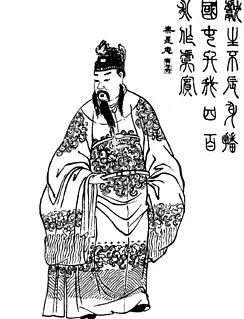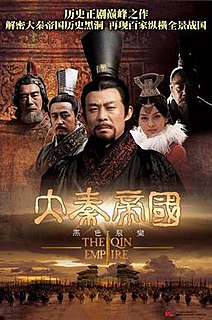| Zhuozi 卓子 | |
|---|---|
| Ruler of Jin | |
| Reign | one month in 651 BC |
| Predecessor | Xiqi |
| Successor | Duke Hui of Jin |
| Died | 651 BC |
| Father | Duke Xian of Jin |
| Mother | Shao Ji |
Zhuozi (Chinese :卓子, died 651 BC) or Prince Zhuo (Chinese :公子卓) was for a month in 651 BC the ruler of the State of Jin during the Spring and Autumn period of ancient China. His ancestral name was Ji (姬) and given name was Zhuo (卓). He was the son of Duke Xian of Jin, and his mother Shao Ji was the younger sister of Duke Xian's favored concubine Li Ji. [1]

Chinese is a group of related, but in many cases not mutually intelligible, language varieties, forming the Sinitic branch of the Sino-Tibetan language family. Chinese is spoken by the Han majority and many minority ethnic groups in China. About 1.2 billion people speak some form of Chinese as their first language.

Jin, originally known as Tang (唐), was a major state during the middle part of the Zhou dynasty, based near the centre of what was then China, on the lands attributed to the legendary Xia dynasty: the southern part of modern Shanxi. Although it grew in power during the Spring and Autumn period, its aristocratic structure saw it break apart when the duke lost power to his nobles. In 453 BC, Jin was split into three successor states: Han, Zhao and Wei. The Partition of Jin marks the end of the Spring and Autumn Period and the beginning of the Warring States period.

The Spring and Autumn period was a period in Chinese history from approximately 771 to 476 BC which corresponds roughly to the first half of the Eastern Zhou Period. The period's name derives from the Spring and Autumn Annals, a chronicle of the state of Lu between 722 and 479 BC, which tradition associates with Confucius.
When Duke Xian died in the ninth month of 651 BC, Crown Prince Xiqi, the son of Li Ji, ascended the throne. However, only a month later Xiqi was killed by the minister Li Ke (里克). Chancellor Xun Xi (荀息) then installed Zhuozi, Xiqi's younger half-brother and cousin, on the throne. But Zhuozi met the same fate as Xiqi: a month later he was also killed by Li Ke, and Xun Xi committed suicide. After Zhuozi's death Li Ke installed his older half-brother Prince Yiwu on the throne, known as Duke Hui of Jin. Duke Hui would later force Li Ke to commit suicide for the crime of killing Xiqi and Zhuozi. [1]
Xiqi was briefly the ruler of the State of Jin during the Spring and Autumn period of ancient China. He was the son of Duke Xian of Jin and his favored concubine Li Ji, and later replaced his older half-brother Shensheng as crown prince. After the death of Duke Xian, he ascended the throne for about a month before being killed by Li Ke.
Duke Hui of Jin, born Yiwu, was the duke of Jin during the Spring and Autumn Period of China's Zhou dynasty.


